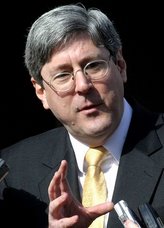 (excerpt is last section of his full article and the photo is courtesy of Raising Kaine) http://www.armedforcesjournal.com/2007/05/2635198
(excerpt is last section of his full article and the photo is courtesy of Raising Kaine) http://www.armedforcesjournal.com/2007/05/2635198"Yingling's comments are especially striking because his unit's performance in securing the northwestern Iraqi city of Tal Afar was cited by President Bush in a March 2006 speech and provided the model for the new security plan under way in Baghdad. He also holds a high profile for a lieutenant colonel, having attended the Army's elite School for Advanced Military Studies.The most insightful examination of failed generalship comes from J.F.C. Fuller's "Generalship: Its Diseases and Their Cure." Fuller was a British major general who saw action in the first attempts at armored warfare in World War I. He found three common characteristics in great generals — courage, creative intelligence and physical fitness." LOLITA C. BALDOR, THE ASSOCIATED PRESS
The Generals We Need: Lt. Col. Paul Yingling
The need for intelligent, creative and courageous general officers is self-evident. An understanding of the larger aspects of war is essential to great generalship. However, a survey of Army three- and four-star generals shows that only 25 percent hold advanced degrees from civilian institutions in the social sciences or humanities. Counterinsurgency theory holds that proficiency in foreign languages is essential to success, yet only one in four of the Army's senior generals speaks another language. While the physical courage of America's generals is not in doubt, there is less certainty regarding their moral courage. In almost surreal language, professional military men blame their recent lack of candor on the intimidating management style of their civilian masters. Now that the public is immediately concerned with the crisis in Iraq, some of our generals are finding their voices. They may have waited too long.
Neither the executive branch nor the services themselves are likely to remedy the shortcomings in America's general officer corps. Indeed, the tendency of the executive branch to seek out mild-mannered team players to serve as senior generals is part of the problem. The services themselves are equally to blame. The system that produces our generals does little to reward creativity and moral courage. Officers rise to flag rank by following remarkably similar career patterns. Senior generals, both active and retired, are the most important figures in determining an officer's potential for flag rank. The views of subordinates and peers play no role in an officer's advancement; to move up he must only please his superiors. In a system in which senior officers select for promotion those like themselves, there are powerful incentives for conformity. It is unreasonable to expect that an officer who spends 25 years conforming to institutional expectations will emerge as an innovator in his late forties.
If America desires creative intelligence and moral courage in its general officer corps, it must create a system that rewards these qualities.... Iraq is America's Valmy. America's generals have been checked by a form of war that they did not prepare for and do not understand. They spent the years following the 1991 Gulf War mastering a system of war without thinking deeply about the ever changing nature of war. They marched into Iraq having assumed without much reflection that the wars of the future would look much like the wars of the past. Those few who saw clearly our vulnerability to insurgent tactics said and did little to prepare for these dangers. As at Valmy, this one debacle, however humiliating, will not in itself signal national disaster. The hour is late, but not too late to prepare for the challenges of the Long War. We still have time to select as our generals those who possess the intelligence to visualize future conflicts and the moral courage to advise civilian policymakers on the preparations needed for our security. The power and the responsibility to identify such generals lie with the U.S. Congress. If Congress does not act, our Jena awaits us.
The Generals We Need: Lt. Col. Paul Yingling
The need for intelligent, creative and courageous general officers is self-evident. An understanding of the larger aspects of war is essential to great generalship. However, a survey of Army three- and four-star generals shows that only 25 percent hold advanced degrees from civilian institutions in the social sciences or humanities. Counterinsurgency theory holds that proficiency in foreign languages is essential to success, yet only one in four of the Army's senior generals speaks another language. While the physical courage of America's generals is not in doubt, there is less certainty regarding their moral courage. In almost surreal language, professional military men blame their recent lack of candor on the intimidating management style of their civilian masters. Now that the public is immediately concerned with the crisis in Iraq, some of our generals are finding their voices. They may have waited too long.
Neither the executive branch nor the services themselves are likely to remedy the shortcomings in America's general officer corps. Indeed, the tendency of the executive branch to seek out mild-mannered team players to serve as senior generals is part of the problem. The services themselves are equally to blame. The system that produces our generals does little to reward creativity and moral courage. Officers rise to flag rank by following remarkably similar career patterns. Senior generals, both active and retired, are the most important figures in determining an officer's potential for flag rank. The views of subordinates and peers play no role in an officer's advancement; to move up he must only please his superiors. In a system in which senior officers select for promotion those like themselves, there are powerful incentives for conformity. It is unreasonable to expect that an officer who spends 25 years conforming to institutional expectations will emerge as an innovator in his late forties.
If America desires creative intelligence and moral courage in its general officer corps, it must create a system that rewards these qualities.... Iraq is America's Valmy. America's generals have been checked by a form of war that they did not prepare for and do not understand. They spent the years following the 1991 Gulf War mastering a system of war without thinking deeply about the ever changing nature of war. They marched into Iraq having assumed without much reflection that the wars of the future would look much like the wars of the past. Those few who saw clearly our vulnerability to insurgent tactics said and did little to prepare for these dangers. As at Valmy, this one debacle, however humiliating, will not in itself signal national disaster. The hour is late, but not too late to prepare for the challenges of the Long War. We still have time to select as our generals those who possess the intelligence to visualize future conflicts and the moral courage to advise civilian policymakers on the preparations needed for our security. The power and the responsibility to identify such generals lie with the U.S. Congress. If Congress does not act, our Jena awaits us.





No comments:
Post a Comment